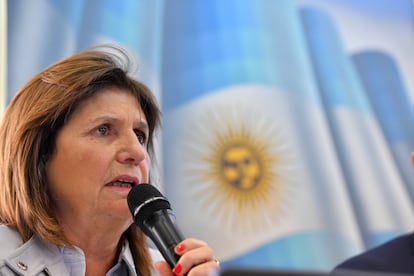Javier Milei’s government announces plan to crack down on Argentina protests
The Minister of Security, Patricia Bullrich, has presented a new protocol against street blockades as tension increases over the economic cuts announced this week


After turning the chainsaw on the economy, Javier Milei’s government has announced its plan to crack down on protests in Argentina. The new Minister of Security, Patricia Bullrich, on Thursday announced a new protocol against street demonstrations. “We are going to bring order to the country so that people can live in peace. The streets will not be taken. “Let them know that if the streets are taken, there will be consequences,” Bullrich told a press conference. Prices have skyrocketed in Argentina following the government’s decision to devalue the peso by 50%.
The new protocol against demonstrations plans to group the four security forces - the Federal Police, the Gendarmerie, the Naval Prefecture, and the Airport Security Police - under the Ministry of Security to break up protests blocking streets and roads. “Action will be taken until the circulation space is completely freed,” Bullrich said. “The forces will use the minimum sufficient force, which will be graduated in proportion to the degree of resistance.” The minister and a former presidential candidate for the traditional right wing, who allied with Milei after her defeat, has appealed to one of the main concerns among her voters: the idea that the street blockades generate disorder that does not allow “people to live normally and in peace”. “We have lived for many years under total and absolute disorder,” Bullrich said. “It is time to put an end to this methodology, to the extortion suffered by citizens.”
Federal forces will have the power to arrest those who “commit crimes” during protests, will be able to act on public transportation to seize protest “material, such as sticks” and to investigate “hooded” citizens or those attending protests while “trying not to be recognized.”
Bullrich has affirmed that a registry of social organizations that “instigate” protests will be created and that she will “send the bill” for “the expenses” of repression to those responsible. “The state is not going to pay for the use of the security forces. The organizations with legal status or the individuals will have to pay,” said the minister, who also announced that foreigners residing in the country with a temporary permit who participate in the protests will be reported to the Immigration Services.
“They can demonstrate on the sidewalk. We do not want street or roadblocks,” the minister said. “This is not a problem of ideologies; it is a problem of understanding once and for all that the country must live in peace and order.”
The announcement came amid rising anger in Buenos Aires due to the economic adjustment plan presented by the Economy Ministry on Tuesday. The government raised the value of the dollar from 400 to 800 pesos, promised not to renew the contracts of public employees who have been in their posts for less than one year, and announced increases in the prices of basic services and public transportation.
The increases promoted by the government will not be felt until February, according to Economy Minister Luis Caputo, but Argentina is used to remarking prices in the street in the face of political shocks. This week, prices in supermarkets have risen by up to 40% after the end of the freeze on costs for basic groceries promoted by Peronism, while the price of fuels has increased by at least 30%.
“We found a patient in intensive care about to die. We are not willing to let him die,” the presidential spokesman, Manuel Adorni, said Wednesday. The labor unions and guilds responded with urgent calls for answers. All eyes are on December 20, the anniversary of the 2001 corralito crisis, when commemorative demonstrations are expected to take place in Buenos Aires in memory of the police repression that left 38 dead.
The Nilda protocol
“The guarantor protocol of Nilda Garré is repealed,” stated Bullrich at the end of her press conference, in reference to the rules governing police actions in the face of protests that was installed in 2011 during the government of Cristina Fernández de Kirchner. Garré, who was Minister of Security at the time, established some basic rules of engagement during demonstrations, such as police intervention being deployed in a “progressive” manner, starting with dialogue with the organizers of the protest. The Garré protocol also established the prohibition of officers who might come into direct contact with the demonstrators from carrying firearms, that rubber bullets could only be used “for defensive purposes,” that all officers and their vehicles should be visibly identified, and that the police should guarantee free news coverage of protests without preventing journalists from taking testimonies and photographs. What the repeal of this protocol would entail remains unclear.
Sign up for our weekly newsletter to get more English-language news coverage from EL PAÍS USA Edition
Tu suscripción se está usando en otro dispositivo
¿Quieres añadir otro usuario a tu suscripción?
Si continúas leyendo en este dispositivo, no se podrá leer en el otro.
FlechaTu suscripción se está usando en otro dispositivo y solo puedes acceder a EL PAÍS desde un dispositivo a la vez.
Si quieres compartir tu cuenta, cambia tu suscripción a la modalidad Premium, así podrás añadir otro usuario. Cada uno accederá con su propia cuenta de email, lo que os permitirá personalizar vuestra experiencia en EL PAÍS.
¿Tienes una suscripción de empresa? Accede aquí para contratar más cuentas.
En el caso de no saber quién está usando tu cuenta, te recomendamos cambiar tu contraseña aquí.
Si decides continuar compartiendo tu cuenta, este mensaje se mostrará en tu dispositivo y en el de la otra persona que está usando tu cuenta de forma indefinida, afectando a tu experiencia de lectura. Puedes consultar aquí los términos y condiciones de la suscripción digital.








































